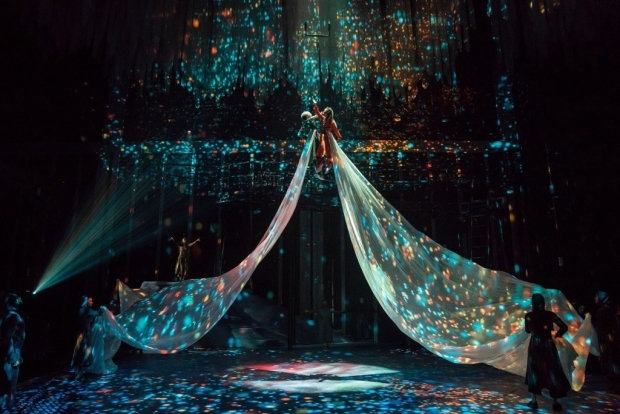Dragon Spring Phoenix Rise at the Shed Is Cirque du Soleil's Low-Rent Cousin
The writers of ”Kung Fu Panda” created a martial arts musical using Sia songs. Yes, you read that correctly.

(© Stephanie Berger)
Why did I go see Dragon Spring Phoenix Rise? Was it my desire to spend more time at the Shed, the new performance and art space at the Hudson Yards? Was it my morbid curiosity to see what a martial arts musical with the songs of Sia, by the writers of Kung Fu Panda, would look like? Or was it just a gross miscalculation on my part? What if it was all three?
Why didn't Dragon Spring Phoenix Rise make any sense? That's a question no one could answer except the creators. Jonathan Aibel and Glenn Berger (writers) are theater neophytes — their best-known property is the Kung Fu Panda film series. Director Chen Shi-Zheng is big in the opera world, and it's very clear from the mise-en-scène that he wants to channel that kind of grandeur. But why couldn't they have given us any context about the plot they constructed so we'd be able to follow the action? What prompted them to use the songs of pop singer Sia to underscore the action? Why is there no exposition to tell us anything about who these people are and why they're at odds?
To wit, who are the dragons, and who are the phoenixes? That's not a inquiry about the identity of the characters, but a literal request to be told backstory about these two rival martial arts factions who all live in that well-known, worldwide hub of martial arts, Flushing, Queens, where an elderly martial arts master named Lone Peak (David Patrick Kelly) is inexplicably the guardian of a magical pool of water, and — also inexplicably — refuses to entrust its care to Lee (Dickson Mibi), his successor whom he has been training for years.
There are more questions than answers about this confusing story. Why is Lone Peak's daughter, Little Lotus (Jasmine Chiu as little Little Lotus; PeiJu Chien-Pott as grown-up Little Lotus), so attracted to a white-haired German guy (David Torok as "Doug Pince," the only character granted a last name) that she not only misses his obvious nefariousness (the white hair and thick German accent are the deadest giveaways I've ever seen) but agrees to marry him six months into their relationship after she conceives twins? (Twinkling blue and pink LED light bulbs wrapped in towels represent these babies.) Then Doug Pince tries to kill one of the babies, leading to a second act straight out of The Comedy of Errors, but without the comedy.
It would have been nice to have Chen on hand to explain some of the more mind-boggling choices. For instance, Mikiko Suzuki MacAdams's $650,000 stage doesn't have any sort of on-ramp, so when little Little Lotus and Doug Pince are pushing their twins in a pram around the perimeter, they have to lift it up several stairs to enter the playing space. (How, in a piece that's so choreographed, did no one teach Chiu and Torok how to properly lift a stroller so it doesn't look like their Lite-Brite babies are going to be tossed out?) Montana Levi Blanco's costumes turn every character into Neo and Morpheus, which is odd since the show doesn't take place in The Matrix. And who told sound designer Brandon Wolcott to auto-tune the few songs to such an extreme degree that the actors sound like robots?
Perhaps that is a strategic cover-up, since Chen and choreographers Akram Khan (movement) and Zhang Jun (martial arts) cast dancers in both the leading and ensemble roles instead of actors (Kelly, a Caucasian performer, is the exception as the elderly Asian martial arts master). Whatever the reason, it was a calamitous choice, because the dialogue and lyrics sound artificial coming out of the mouths of people who aren't trained to deliver lines or sing onstage, so they had to overcompensate. Spectacle, sadly, seems to be the No. 1 priority here, but that fell short too: None of the blows landed during the battle scenes, and the turgid aerials looked like Cirque du Soleil's low-rent cousin.
Most importantly, and really the thing I cannot stop thinking about, is this: Why did they not realize how troubling it would be in 2019 to have non-Asian actors play Asian characters? How did no one stop them during the development process to say, "Seriously? It's 2019."
With my head fizzling out with unresolved questions two unfathomably long hours later, I rose like a phoenix and went home, wishing I had fled at intermission.







